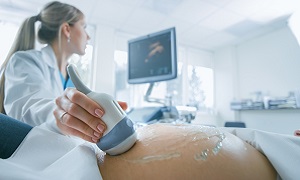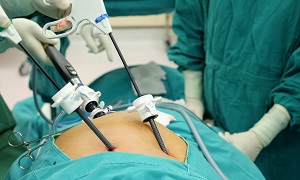Ectopic Pregnancy
When a fertilized egg implants itself outside of the uterus, it is termed as ectopic pregnancy. It’s also referred to as tubal pregnancy, as most of such pregnancies happen in the fallopian tubes. The problem can be with the egg or the tube and the egg get stuck on the journey to the uterus.
An ectopic pregnancy can also occur in other parts of the body, such as the ovary, abdominal cavity or the lower part of the uterus. This kind of pregnancy is unable to proceed normally. The fertilized egg is unable to survive and the growing tissue can cause life-threatening bleeding if it is left untreated.
Doctors usually consider how far the pregnancy has progressed and how severe the symptoms are before they proceed with their treatment.
Symptoms
Symptoms might not be noticeable at first for some women. But for others, a missed period, breast tenderness as well as nausea are common symptoms. If you take a pregnancy test, the result will show as positive. However, an ectopic pregnancy can’t continue as normal. Signs and symptoms become more noticeable over time, as the fertilized egg grows in the improper place.
Light vaginal bleeding and pelvic pain, are often the first warning signs of an ectopic pregnancy. If blood leaks from the fallopian tube, you might feel shoulder pain or an urge for a bowel movement. The specific symptom which you experience usually depends on where the blood collects and on which nerves are irritated.
Emergency Symptoms
If the fertilized egg continues growing in the fallopian tube, it can cause a rupture of the tube. Heavy bleeding inside the abdomen is also likely. This can be life-threatening and might show symptoms such as lightheadedness, fainting and shock.
If you are seeing any signs and symptoms of an ectopic pregnancy, such as severe abdominal or pelvic pain accompanied by vaginal bleeding, shoulder pain or extreme lightheadedness, you should consider seeking emergency medical help.
Causes
A tubal pregnancy which is the most common type of ectopic pregnancy, happens when a fertilized egg is stuck on its way to the uterus, as the fallopian tube might be damaged due to inflammation or is misshapen. Hormonal imbalances or abnormal development of the fertilized egg might play a role as well.
Diagnosis
A pelvic exam might also help your doctor identify areas of pain, tenderness or a mass in the fallopian tube or the ovary. Your doctor will not be able to diagnose an ectopic pregnancy by examining you alone. Blood tests as well as ultrasounds will be required.
Pregnancy test
Ultrasound
Using transvaginal ultrasound, your doctor can see the exact location of your pregnancy. A wand-like device will be placed into the vagina for the test. This test uses sound waves in order to create images of your uterus, ovaries and fallopian tubes. The pictures are then sent to a nearby monitor.
Abdominal ultrasound is another type of ultrasound where the wand is moved over your belly and it may be used to confirm the pregnancy or evaluate for internal bleeding.
Other blood tests
A complete blood count will also be required to check for anemia as well as other signs of blood loss. If you’ve been diagnosed with ectopic pregnancy, your doctor might also order tests to check your blood type just in case you require a transfusion.
Treatment
It is not possible for the fertilized egg to develop normally outside the uterus. Therefore, the ectopic tissue will need to be removed, to prevent serious life-threatening complications. This might be done using a medication, abdominal surgery or laparoscopic surgery, depending on your symptoms and the time the pregnancy was discovered.
Medication

Medication such as methotrexate can also be used to an early ectopic pregnancy where there is no unstable bleeding. This medication can stop cell growth and also dissolve existing cells. It is given through injection. However, before receiving this kind of treatment, confirming the diagnosis is extremely important.
After the injection, the doctors will order another HCG test for determining how well the treatment is working and to see if you will be requiring any more of this medication.
Laparoscopic procedures
Salpingostomy and salpingectomy are two laparoscopic surgeries that are also used to treat some kinds of ectopic pregnancies.
In a salpingostomy, the ectopic pregnancy is removed after which the tube left is to heal by itself. While in a salpingectomy, the ectopic pregnancy and the tube both are removed.
Depending on the amount of bleeding you are facing, and the damage, it will be decided which procedure is best for you.
Emergency surgery:
If the ectopic pregnancy is leading to heavy bleeding, you may also require emergency surgery. which can be done laparoscopically or through an abdominal incision. It is possible to save the fallopian tube in some cases, though typically a ruptured tube needs to be removed.
Risk factors
Some of the factors which can make someone more likely to have ectopic pregnancy include-
- Inflammation or infection: Sexually transmitted infections like gonorrhea or Chlamydia, might cause inflammation in the tubes and other nearby organs, which might increase your risk of an ectopic pregnancy.
- Previous ectopic pregnancy: Previously if you have had this type of pregnancy, you might be likely to have one more.
- Fertility treatments: According to research, it has been suggested that women who have undergone IVF or similar treatments are more likely to have an ectopic pregnancy. Infertility might raise the risk as well.
- Tubal surgery: Surgery for correcting a closed or damaged fallopian tube can increase the risk of an ectopic pregnancy.
- Smoking: Cigarette smoking just before you get pregnant might also increase the risk of an ectopic pregnancy.
Prevention
Though there is no way to prevent an ectopic pregnancy, limiting the number of sexual partners and using condoms during sex can help in preventing STDs, which reduces the risk of pelvic inflammatory disease. It is also important to avoid smoking or inhaling smoke when one is pregnant.




